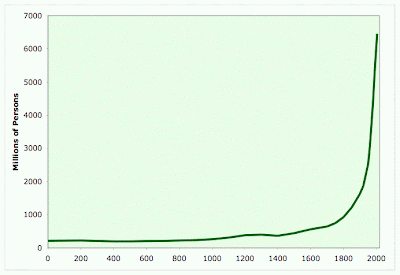Madagascar is already under tremendous pressure from its own population for farmland. The rain forest there, which is home to many, many endangered species, is under tremendous pressure and is being destroyed at terrifyingly high rates. That pristine environments are now being threatened by population growth in nations thousands of miles away is a new threat.

Take a look at how ridiculous the population growth has been in the past 100 years (image taken from http://www.theoildrum.com/). At the same time the amount of land available for use on Earth has not increased at all. Leaving some nations in situations like those that are now being seen in South Korea, where people are outsourcing agriculture for their survival.
Daewoo is leasing the vast tract of land - half the size of Belgium - for 99 years and hopes to produce 5 million tonnes of corn a year by 2023.
It will use South African expertise and local labour on the plantations.
Asian countries have been trying to ensure access to food supplies after grain prices soared earlier this year.
Daewoo will also grow palm oil on another 300,000 acres of land leased in Madagascar.
The conglomerate is already developing a 50,000-acre corn farm in Indonesia in partnership with South Korea's biggest feed maker, Nonghyup Feed.
Other countries short of arable land, such as Saudi Arabia and Kuwait, have also been seeking agricultural investments in Africa or Asia.
And some African countries have expressed interest in receiving foreign investors.
Angola has offered farmland for development while Ethiopia's prime minister, Meles Zenawi, has said he was eager to see foreign companies take a stake in his country's agriculture.
My college roommate Kevin is in the Air Force and was stationed in Korea for a while. When last I spoke to him he had a strong impression of how very urbanized that nation is, as opposed to Germany (where he was stationed previously) and the United States. The article notes that South Korea is not alone, that Kuwait and Saudi Arabia are also looking to acquire arable land by proxy. I suspect that other nations will be looking to outsource their food needs, as their population continues to explode. (My guess: Nigeria and the Philippines will soon be on this list).
The population growth issue brings up many spiritual and moral questions. It is one thing to have the communist government of China limit their subjects to one child per couple, but it is another thing for a free nation to impose such restrictions. Some faiths have come out as being strongly against birth control. How then do we deal with this great looming problem?




No comments:
Post a Comment